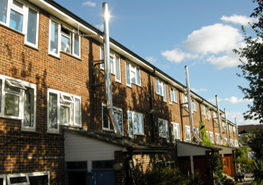
Online access is now Free. If you have an existing subscription click here for more information
Enough hot air
Published 23 October 2023
We need action, not another consultation exercise, if we’re to make the nation’s housing more energy efficient, says Tim Yeo
The UK must cut its greenhouse gas emissions by at least 80 per cent by the middle of this century. That’s the recommendation of the committee on climate change, the expert body that advises the government on how Britain needs to respond to the challenge of global warming.
The stakes could not be higher. That 80 per cent figure is based on calculations of the size of effort the world has to make if we are to have a hope of limiting global warming to two degrees celcius. Any higher, and the risks of catastrophic climate change get uncomfortably large.
Meeting this target will be a truly unprecedented challenge. Every sector of the economy, every aspect of our lives in which we consume energy released from burning fossil fuels, needs to play its part.
Cutting emissions from housing should be one of our greatest national priorities. There are more than 26 million flats and houses in the UK, collectively responsible for more than a quarter of the country’s carbon emissions.
Even with expected rates of housing construction – and demolition – some two-thirds of the housing stock in 2050 will be made up of homes already standing today. This illustrates the importance of improving the energy efficiency of existing housing – as well as increasing micro-and community renewable energy generation to existing neighbourhoods.
The government has some good policies in this area, and has made some promising recent announcements. For instance, the chancellor recently announced an extra £100 million for the warm front programme, which helps vulnerable households by providing insulation.
And the Department of Energy and Climate Change has recently issued a consultation on significantly expanding the advice and assistance available to households up and down the country. But one might equally ask what the government is doing in holding yet another consultation on something which is simple common sense – and which housing, energy, and environmental experts have been urging for years.
There is a particular need for the government to act now. A massive programme of retrofitting energy efficiency improvements to the nation’s housing would be the Chancellor’s best response to the recession.
As the environmental audit committee highlighted in our recent report on green fiscal stimulus, such a mass programme to improve the quality of the nation’s homes would be labour-intensive and fast to implement, drawing on the existing skills of the construction industry and related trades. Not only that, but it could sustain employment – and help keep money circulating – in local communities in every region of the country. And in doing so, it could develop specific skills and supply chains in what will without doubt be a long-term growth sector.

Green remedy: ‘A massive programme to improve the energy efficiency of the nation’s housing would be the best response to the recession’
Some people have talked about such programmes as representing – with an echo of the kind of Keynesian policies developed in the great depression – a kind of green New Deal. As they put it, such action would have a triple benefit – cutting emissions, reducing fuel poverty, and enhancing the UK’s energy security.
A vital element of this approach needs to be the strengthening of the current system of standards and inspection. Some might argue that in a time of economic recession, this is a burden the building industry cannot afford.
This would be a terrible mistake. Strong regulations are vital if retrofitting is to deliver the energy savings we will be paying for, and if new housing is to make a step-change improvement in sustainability. As the UK Green Building Council (UK GBC) told my committee: ‘There is no point designing a ‘sustainable home’ if no checks are made to ensure this goal has been met.’
In fact, in three inquiries since 2005 we have heard evidence on the weaknesses of the building control system. The Commission for Architecture and the Built Environment, the Building Research Establishment, the Environment Agency, and the UK GBC all told us of concern over building work which fails to meet required standards – commonly through badly fitted insulation.
Another feature of the recession is, of course, the collapse in new builds. Here again the government could make an enormous difference by rolling out a national policy to get empty buildings into use. My committee has examined evidence from the Empty Homes Agency that there is the potential for vacant buildings to provide up to 1.2 million new homes.
At the time we recommended that the government investigate this potential, and assess the environmental benefits that converting existing properties would have over building new homes.
Now that the house-building market has seized up, the case for more decisive action on this from government has grown even stronger.
Tim Yeo is Conservative MP for South Suffolk and chairman of the House of Commons environmental audit select committee.

